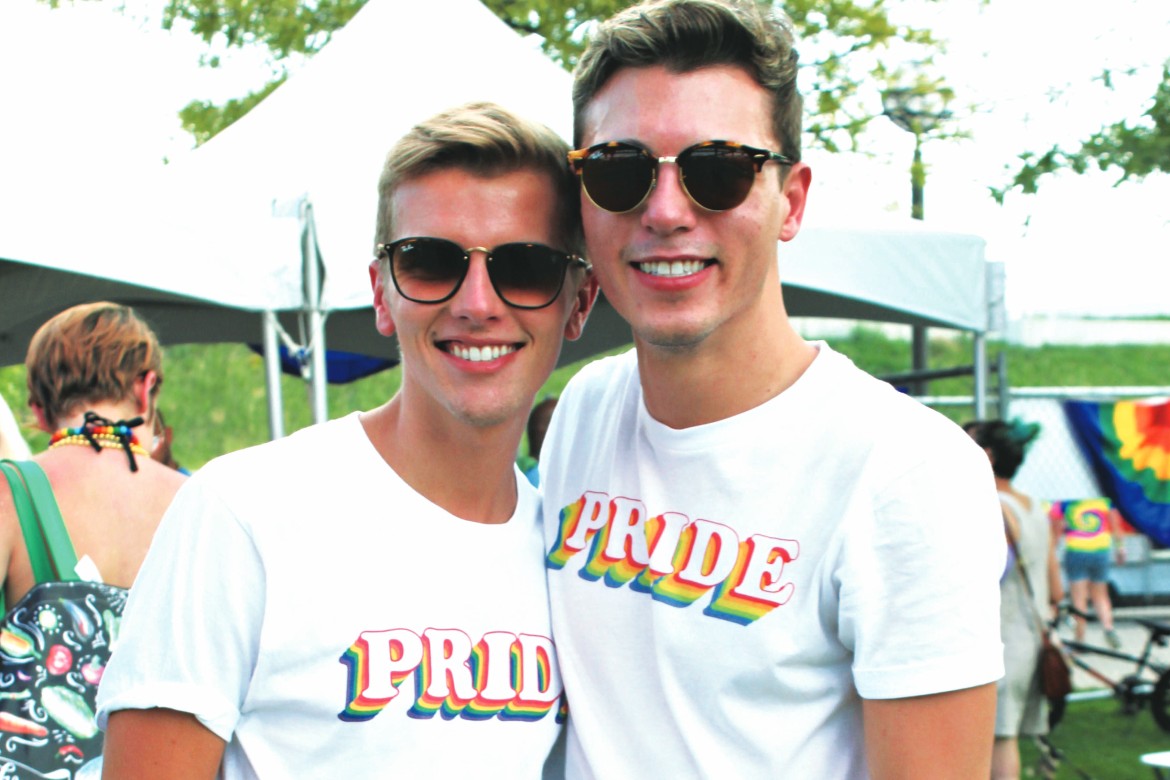With a new LGBTQ+ Community Center and two pride celebrations, you could say that Louisville, Kentucky is looking better than ever for LGBTQ+ travelers.
When my mother used to put on her nicest high heels, gloves, and hat to go shopping on Louisville’s bustling Fourth Street, she surely never would have imagined that a few decades later I’d be enjoying a wonderfully raunchy drag show on that very street, but such is the magnificent evolution of Kentucky’s largest city.
With a brand-new LGBTQ+ Community Center, the return of two sizeable pride celebrations, and yet another impressive equality score from the Human Rights Campaign, you could say that Louisville, Kentucky is looking better than ever for LGBTQ+ travelers.
Located on the banks of the Ohio River along the Indiana border, the city of Louisville was founded in 1778 and named after France’s King Louis XVI. At one time, it was the second largest city in the South, outranked only by New Orleans. And while it may no longer be at the top of the population listings, Louisville has forged a 21stcentury reputation as one of the most progressive and LGBTQ friendly destinations in the south.
The Human Rights Campaign’s Municipality Equality Index, in fact, has given the city a perfect score every year since 2015, based on its continued and extensive support of the LGBTQ+ community. In addition, The New York Times has listed Louisville as one of 52 Places to Go in 2023, praising the city’s welcoming environment and multiple attractions.
“Louisville is overall a very welcoming city for LGBTQ people,” says Mike Slaton, executive director of the Louisville Pride Foundation, which operates several LGBTQ+ events as well as a new community center that opened in 2022. “Louisville has evolved similarly to the rest of the country. It has gone from being where LGBTQ+ people felt safe in a very small number of places to much broader acceptance in the community at large.”
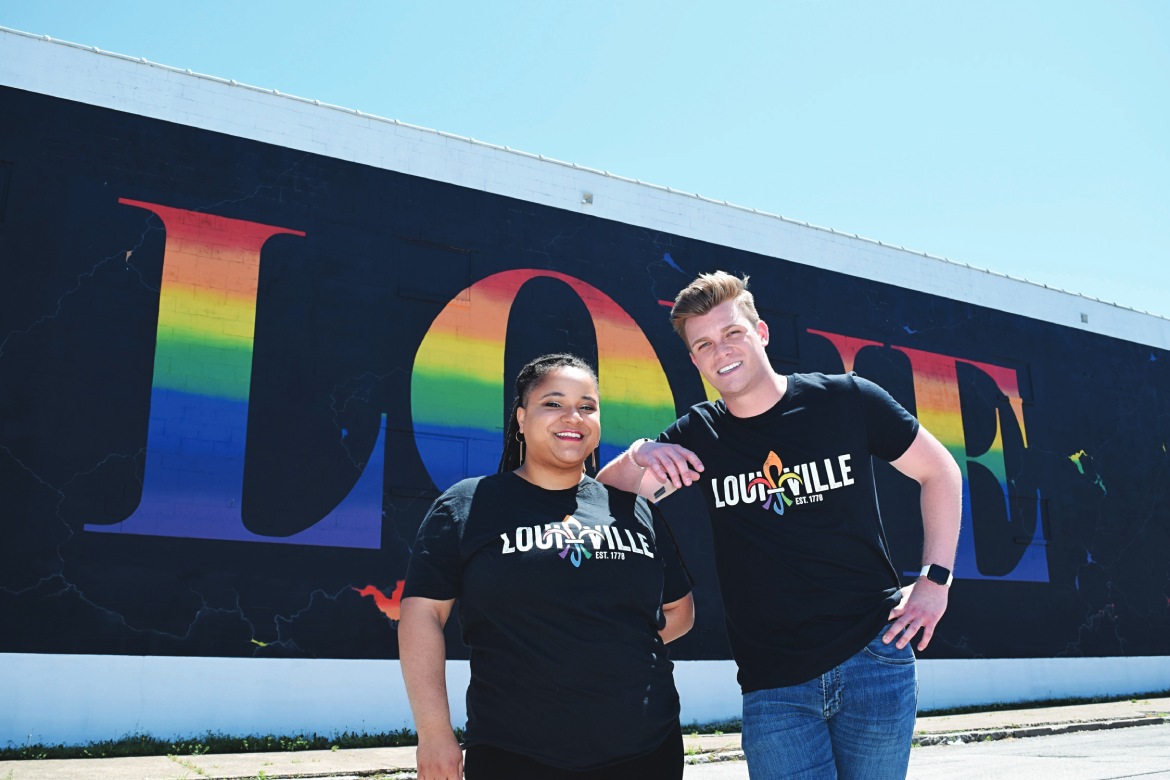
Louisville CVB (Photo by Mark Chesnut)
I discovered that first-hand during my most recent visit, as my husband and I experienced warm hospitality in a variety of bars, restaurants, and stores. “There are more spaces that are queer affirming without being exclusively LGBTQ,” Slaton says. “At most mainstream places, the default is that somebody is going to at least experience tolerance.”
Slaton adds that while Louisville, as the state’s largest city, is certainly the Bluegrass State’s biggest hub for LGBTQ acceptance, Kentucky overall has progressed, even as it faces challenges. In February 2023, for example, the Kentucky Senate passed a discriminatory bill that targets LGBTQ+ youth and hinders the ability of teachers to develop safe and inclusive classroom environments. The bill was moving to the house as of press time.
The big difference now, compared to decades past, is that there is more vocal support of LGBTQ+ rights. Even as the Senate was discussing the legislation, hundreds of students at a Louisville high school walked out of class to protest the series of anti-LGBTQ bills introduced by Republicans.
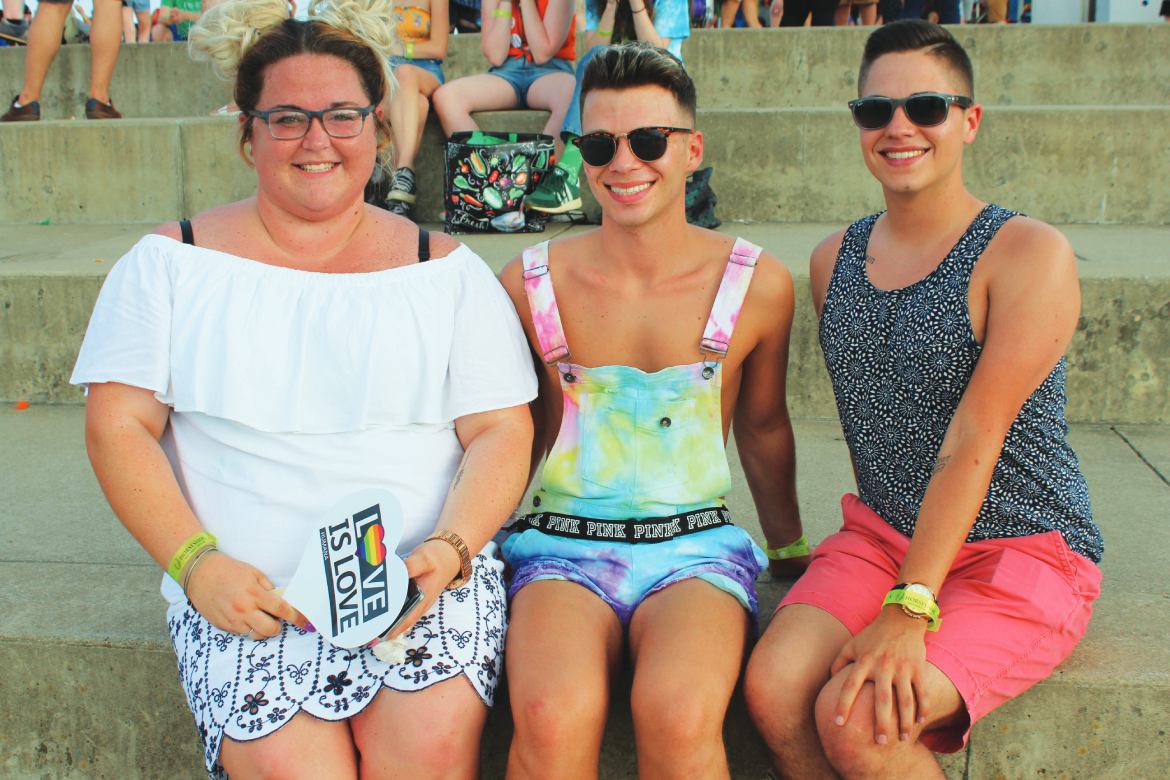
Celebrating Pride (Photo by Mark Chesnut)
“In the entire state, like the entire country, every time we get an advance there’s pushback,” Slaton says. “You now see people being more visibly LGBTQ in the state. I think something like 25 communities across the state have passed fairness ordinances protecting people from discrimination based on sexual orientation and gender identity, and you’ve got pride events happening in 10 or more cities, most of which are towns.”
LGBTQ visitors to Louisville, meanwhile, will find a welcoming environment and lots of memorable activities to enjoy.
WHERE TO FIND LGBTQ LIFE IN LOUISVILLE
Kentucky’s biggest city has a thriving LGBTQ scene that’s visible in various parts of the city, especially in places like the leafy, upscale neighborhood called the Highlands. When I was a kid, I spent time there visiting my Uncle Ed and Aunt Agnes, but they certainly had no clue that the blocks surrounding their house would become a hotspot for LGBTQ life as well as quirky-cool shopping, and trendy dining.
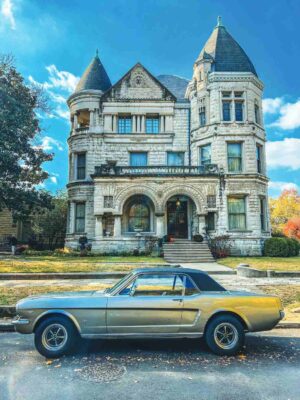
Historic architecture in Old Louisville (Photo by Mark Chesnut, DepartureLevel.com)
Bardstown Road, the neighborhood’s main commercial strip, is home to fun LGBTQ nightlife venues and also has a variety of LGBTQ-friendly businesses, including Carmichael’s Bookstore, an indie bookshop that includes LGBTQ authors and gifts among its shelves.
One of our favorite places for a drink is Big Bar, which more than doubled in size in 2022 by annexing a sleekly designed new corner space with a stage, dance area, an upstairs lounge, and expanded outdoor seating on the street. The venue hosts events including RuPaul’s Drag Race viewing parties and live drag shows. Just a few blocks away, Chill Bar recently added a large, high roof covering much of its front-yard patio, making it even more comfortable for sipping a cocktail outdoors. The venue has bar service both indoors and outdoors, as well as a small dance area inside.
Other parts of the city offer additional diversion after dark. For dancing, the largest space is at Play, a club just a few minutes by car from the Highlands. Lively drag shows are also a big draw here. Or, for a laidback vibe, head to The House Lounge, a bar in the historic Old Louisville neighborhood that hosts open stage nights, karaoke, and other activities. Nearby, the new LGBTQ community center also serves as a hub for activities and services.
If you love festivities, then one of the absolute best times to visit Louisville is during one of the annual pride events. It says a lot about Louisville’s inclusive environment that the city hosts not one but two pride celebrations every year. Kentuckiana Pride, named for the region along the Kentucky/Indiana border where it takes place, attracts more than 20,000 revelers in June, with a parade and festival and lots of live musical performances at the Big Four Park on the river’s edge. And in September, the Louisville Pride Festival, which dates to 2015, takes over much of Bardstown Road in the Highlands, filling it with blocks of vendors, food trucks, and multiple stages for live drag shows and musical acts.
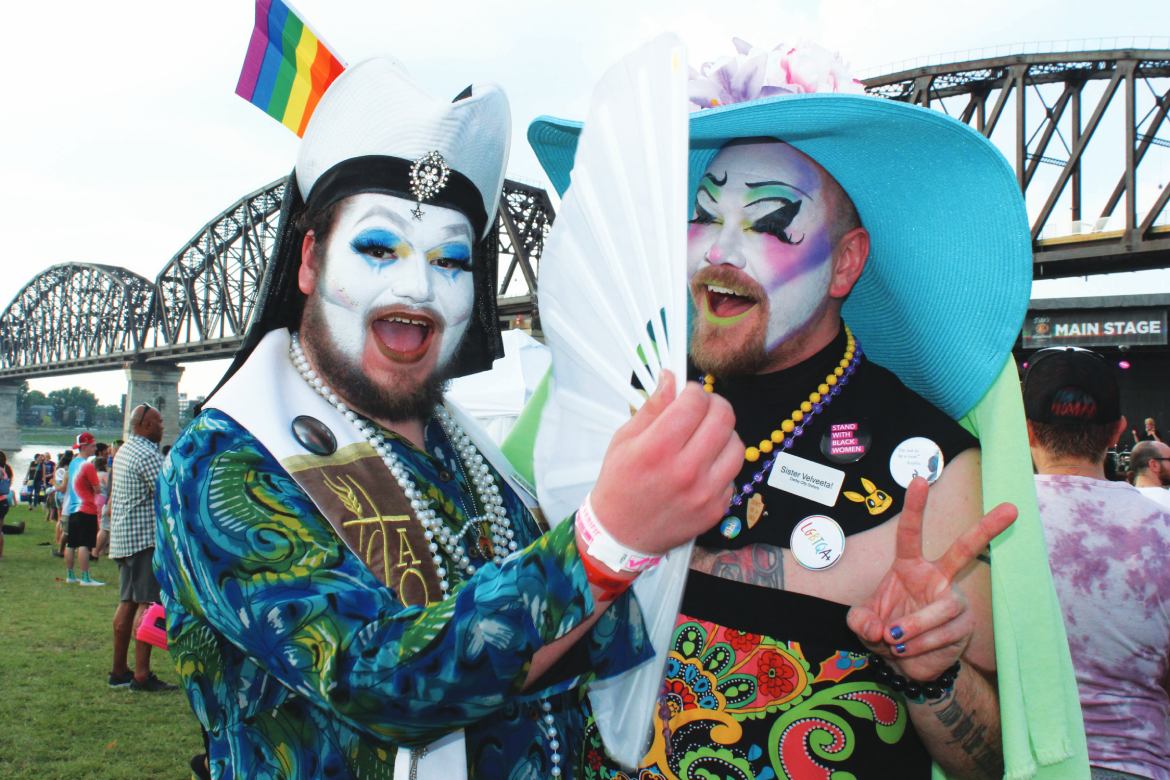
Celebrating Pride (Photo by Mark Chesnut)
The Louisville Pride Foundation, which oversees the Louisville Pride Festival, also hosts an array of other annual events, including the Sunday Funday Derby Drag Show, a brunch that takes place a week before the legendary Kentucky Derby; the Transgender Wellness Summit, which takes place in the spring; the Louisville Pride 5K Run/Walk, a family-friendly event that kicks off Pride Week in June; and a queer Halloween evening cruise on the Ohio River aboard the Belle of Louisville, a riverboat built in 1914 that’s a national historic landmark.
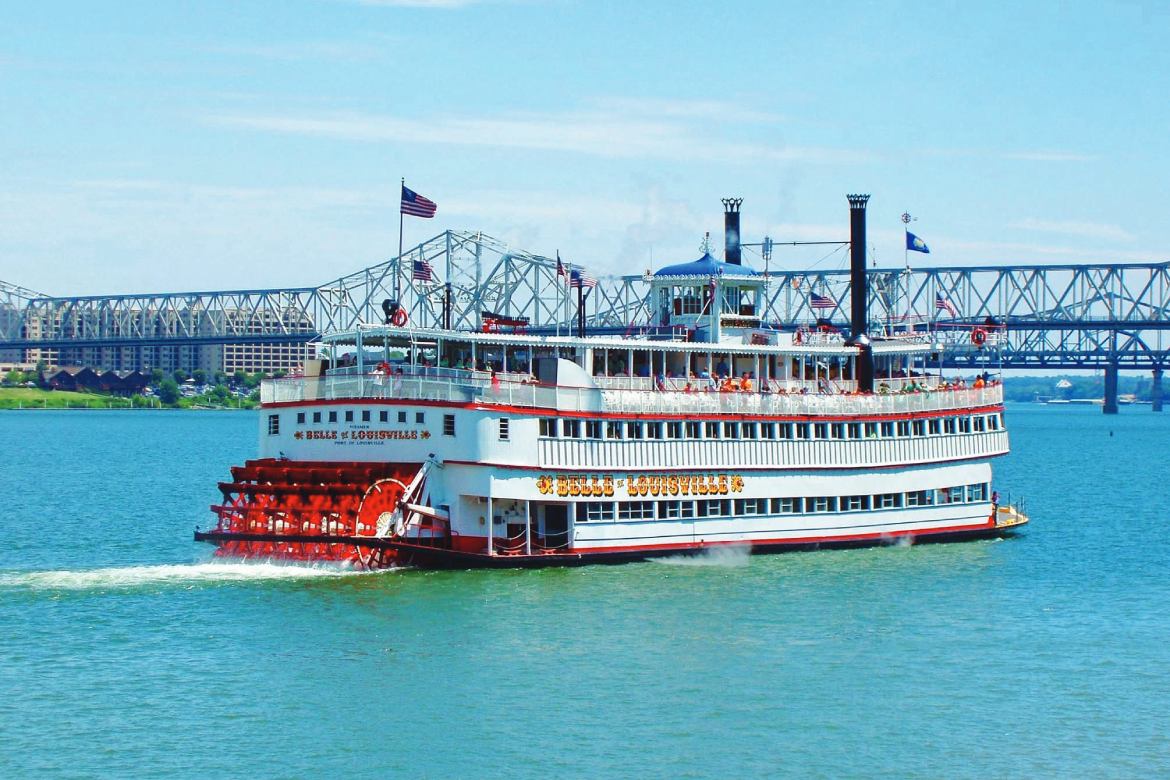
Colonel Sanders Museum (Photo by Mark Chesnut, Departurelevel.com)
This year, the city will likely welcome even more LGBTQ+ events, thanks to new efforts by the Louisville Pride Foundation. “We’re looking at growing by adding a comedy show and we’re talking about working closely with the Louisville LGBT Film Festival,” said Slaton. “We’re also talking about maybe doing a books and authors forum and art show during the month of September, so that Louisville Pride becomes a multi-day, multi-event festival.”
THINGS TO DO IN LOUISVILLE
Regardless of the time of year you visit, you’ll find that an array of experiences await. And you’ll likely find that it’s impossible to talk about tourism in Louisville without mentioning bourbon, horses, and a couple famous people: Muhammad Ali, the legendary boxer who was born here, and Colonel Harland Sanders, the founder of Kentucky Fried Chicken, who based his world-famous company here.
There are lots of other celebrities from Louisville, of course, including actress Jennifer Lawrence and Jack Harlow, the rapper who in 2022 donated to three LGBTQ+ organizations (the Louisville Pride Foundation, Queer Kentucky, and Sweet Evening Breeze, which serves LGBTQ+ young adults). But Ali and Sanders are the long-standing faces of the city that are most easy to work into your tourism itinerary.
The Muhammad Ali Center, located in downtown Louisville, is a multicultural venue with a museum dedicated to the life of the much loved boxer’s achievements in sports, activism, and human rights.
The visual tributes to Colonel Sanders are on a much smaller scale, but the Colonel Sanders Museum, located inside the KFC corporate headquarters, is still a fun place to visit, if for nothing else than to witness a startlingly realistic audio-animatronic robot version of the Colonel come to life and talk as you enter the room.
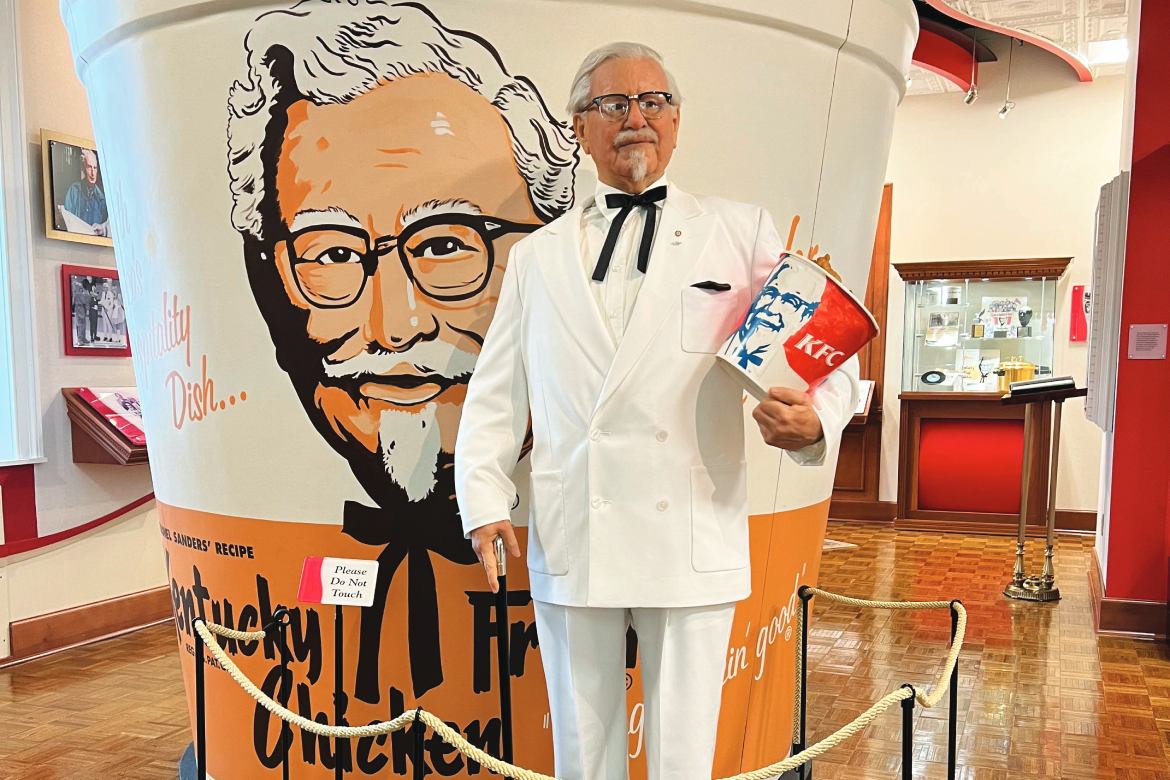
Colonel Sanders Museum (Photo by Mark Chesnut, Departurelevel.com)
Both Muhammad Ali and Colonel Sanders are buried in another place you may want to put on your itinerary: Cave Hill Cemetery, a 296-acre resting place that dates to the 19th century and is something of a combination between a city park and an open-air art museum, thanks to the dozens of dramatic sculptures that mark many of the graves. It’s worth a drive through to admire the verdant hills, swan-filled lake, and striking works of memorial art.
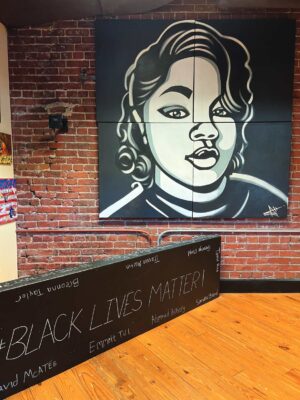
Breonna Taylor Art at Roots 101 Museum (Photos by Mark Chesnut, DepartureLevel.com)
Also worth a visit is the Roots 101 African American Museum, which was founded in 2019 and features fascinating and extensive exhibits about African heritage, African-American traditions, and Black contributions to the arts, the world of sports, and the civil rights movements.
Baseball fans, meanwhile, won’t want to miss a visit to the Louisville Slugger Museum & Factory, which is dedicated to the history of the much-loved baseball bat, with museum exhibits and guided factory tours available. Also in the sporting vein is the Kentucky Derby Museum, which hosts permanent and temporary exhibits that explore the city’s most famous sporting tradition.
The Kentucky Derby, of course, is one of the peak tourism seasons for the city of Louisville, and you may have trouble finding accommodations if you don’t book way in advance. A visit to the museum, however, can provide a peek at some of the excitement, including a walk onto the actual track, while avoiding the crowds.
Another local tradition in this part of the state is bourbon making, and Louisville continues to provide new ways to explore the spirit. The Frazier History Museum, an affiliate of the Smithsonian Institution that features a variety of local history exhibits, is home to the Kentucky Bourbon Trail Welcome Center, the official starting point of the Kentucky Bourbon Trail. It’s a perfect place to start your spirited exploration of the city. The Urban Bourbon Trail, created by Louisville Tourism, lists a variety of bars and restaurants that specialize in bourbon.
Bourbon enthusiasts will do well with a visit to Whiskey Row, a historic area that was home to the city’s bourbon industry starting in the late 19th century, with buildings that date between 1852 and 1905. Today, visitors can take guided tours at distilleries including Old Forester Distilling Co., which also offers cocktail classes, and the Evan Williams Bourbon Experience, which offers multiple options for visiting, including a traditional tour and tasting, and a Speakeasy Tasting Experience that evokes the atmosphere of prohibition-era Louisville, complete with a password to access the speakeasy. Another interesting option at Evan Williams is the Ideal Bartender Experience, which provides an audience and premium whiskey tasting with Tom Bullock, who’s described as the first Black American to write and publish a cocktail book.
Spirits of a different kind are a big draw at the Waverly Hills Sanatorium, an abandoned tuberculosis hospital that dates to 1910. After becoming a nursing home in 1962 and closing down fully in 1981, Wavery Hills has appeared in various paranormal TV shows; “Ghost Hunters” called it one of the most haunted hospitals in the United States. Visits are only via guided tours and must be reserved in advance, but there are several options, including a public tour, private tours for individual groups, and even private overnight stays for brave souls.
Waverly Hills definitely isn’t one of the top attractions for first time visitors (unless you’re a fan of the paranormal), but we paid a visit and found the tour quite entertaining and interesting, especially if you’re curious about the history of healthcare and architecture, or hankering to hear some good ghost stories.
WHAT TO EAT IN LOUISVILLE
Fried chicken may be an obvious choice when looking for traditional local cuisine, but there are other culinary treats that you probably haven’t heard of if you’re not familiar with the region, and they’re worth trying, too. One of them is burgoo, a hearty stew with lots of meat and vegetables. One person I met joked that burgoo traditionally contains “anything that doesn’t make it across the road,” but modern versions are decidedly less oriented toward roadkill. My hubby and I enjoyed a big bowl at Mark’s Feed Store, a folksy, casual place in the Highlands that’s ideal for meat lovers.
Another locally famous dish, and this one is specifically and inarguably from Louisville itself, is the hot brown. Invented at the Brown Hotel in the 1920s, this tasty and filling meal is essentially an open-faced turkey sandwich, with bacon and Mornay sauce on top. It’s the kind of thing you shouldn’t order unless you’re really hungry.
During my most recent visit, we had the good fortune to accidentally land in Louisville during the first-ever Louisville Hot Brown Week, seven glorious days of culinary celebration that definitely would ruin any diet plan. Multiple restaurants participate, inventing their own unique variation of the hot brown, and there’s even an app that allows diners to register and log their consumption. The original birthplace, J. Graham’s Café at The Brown Hotel, is a logical venue to sample this dish, and we also enjoyed a hot brown taco and hot brown sliders at Agave and Rye, a hip bar and restaurant in the Highlands that specializes in tacos, tequila, and bourbon.


